Artificial Intelligence: Improving Financial Reporting to Stakeholders
VerifiedAdded on 2023/06/05
|9
|2087
|228
Report
AI Summary
This report explores the pivotal role of Artificial Intelligence (AI) in enhancing the quality of financial reporting to stakeholders. It emphasizes how AI technologies streamline processes, reduce errors, and provide valuable insights, ultimately saving time and costs for organizations. The study reviews literature highlighting AI's ability to attract new customers and employees, reduce operational costs by up to 80%, and improve accuracy in financial forecasting. It also touches upon the increasing adoption of AI and machine learning (ML) in response to the need for efficient, around-the-clock operations, particularly in areas like fraud prevention and customer experience. The research methodology involves a qualitative approach, utilizing secondary data sources to gather in-depth information. The report concludes by recommending that finance industry organizations embrace AI to improve financial reporting quality and risk assessment, thereby enhancing overall performance and stakeholder value. Desklib provides students access to similar solved assignments.
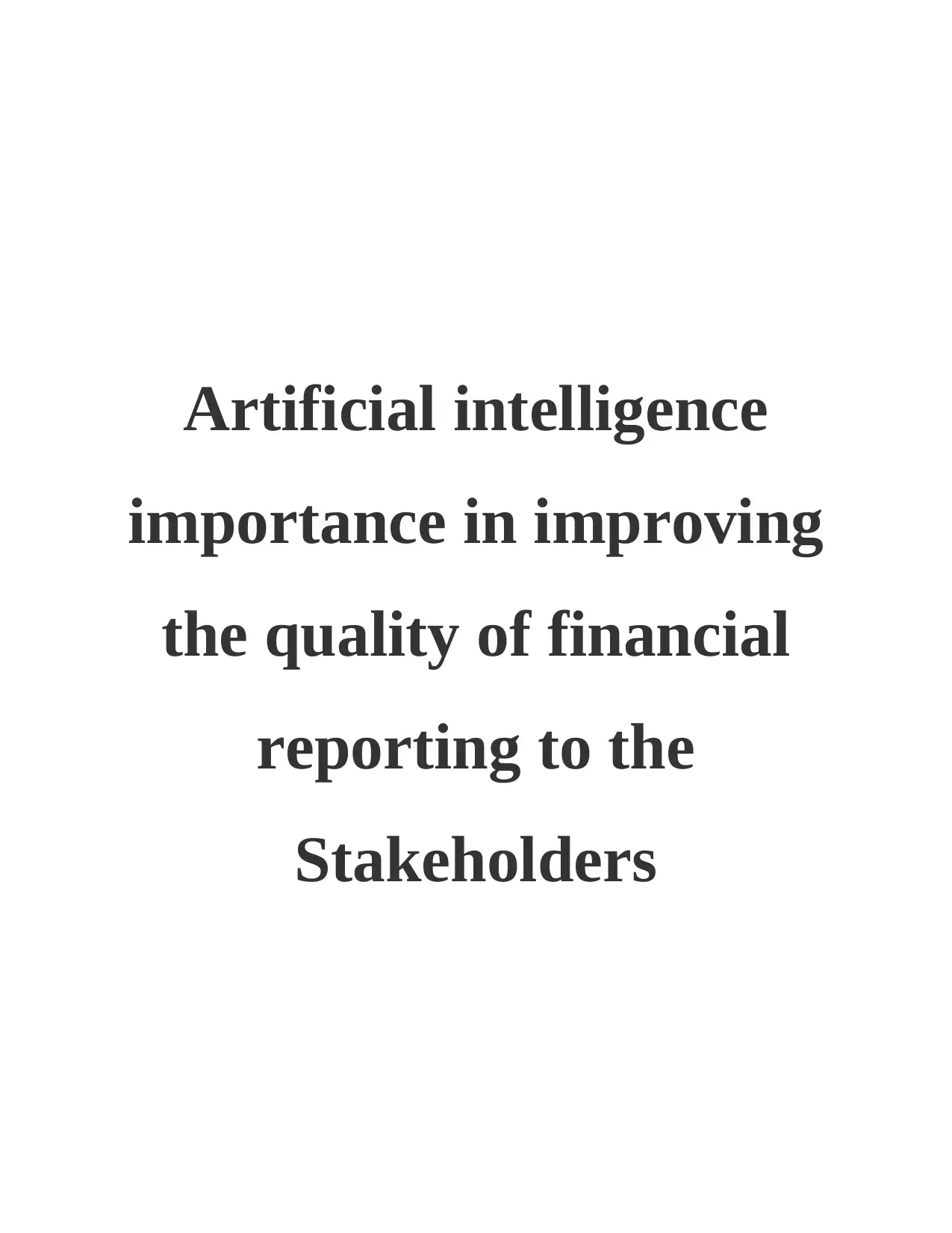
Artificial intelligence
importance in improving
the quality of financial
reporting to the
Stakeholders
importance in improving
the quality of financial
reporting to the
Stakeholders
Paraphrase This Document
Need a fresh take? Get an instant paraphrase of this document with our AI Paraphraser

Contents
Abstract............................................................................................................................................3
INTRODUCTION ..........................................................................................................................4
Research Methodology....................................................................................................................7
Conclusion.......................................................................................................................................7
Recommendations............................................................................................................................8
REFERENCES................................................................................................................................9
Abstract............................................................................................................................................3
INTRODUCTION ..........................................................................................................................4
Research Methodology....................................................................................................................7
Conclusion.......................................................................................................................................7
Recommendations............................................................................................................................8
REFERENCES................................................................................................................................9
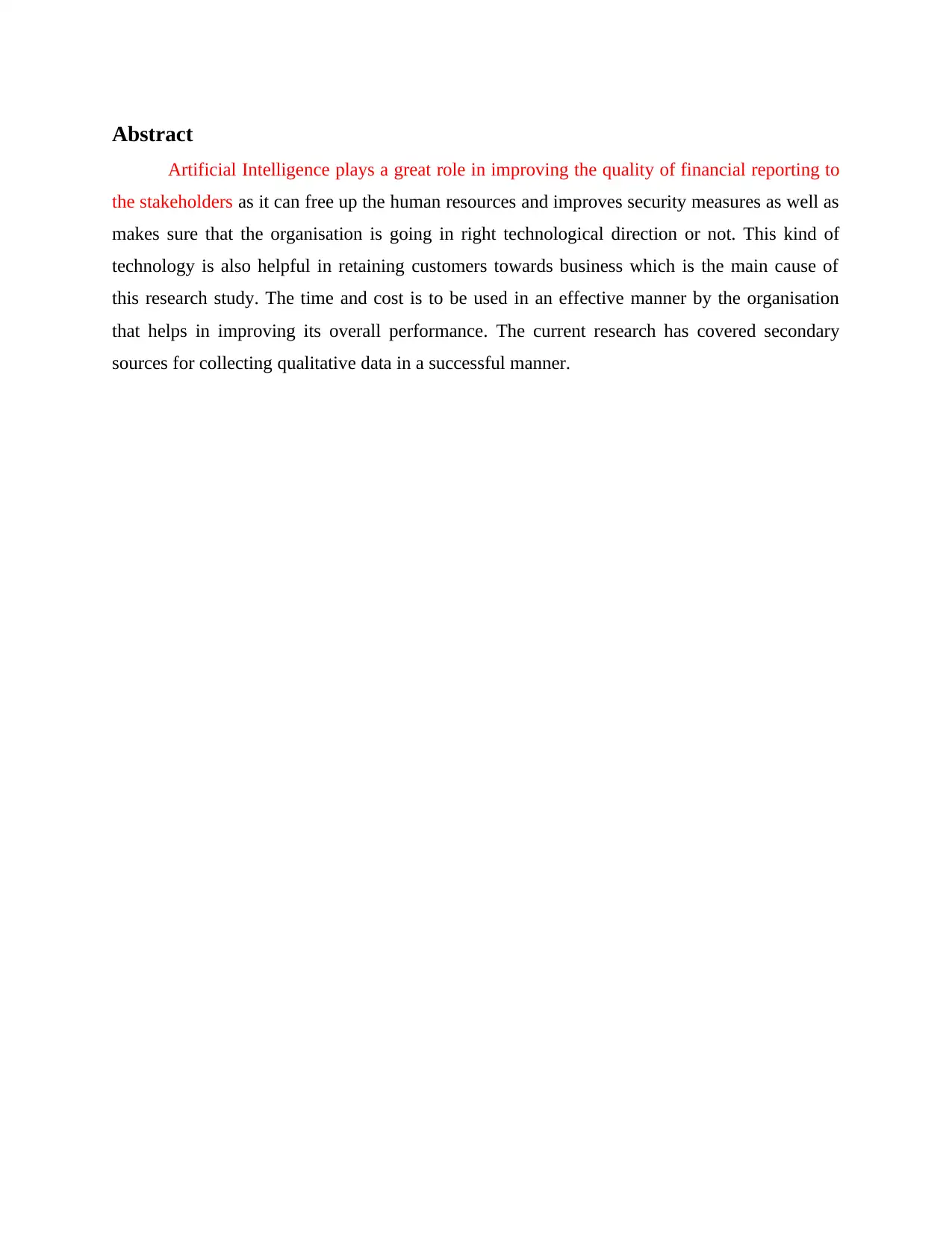
Abstract
Artificial Intelligence plays a great role in improving the quality of financial reporting to
the stakeholders as it can free up the human resources and improves security measures as well as
makes sure that the organisation is going in right technological direction or not. This kind of
technology is also helpful in retaining customers towards business which is the main cause of
this research study. The time and cost is to be used in an effective manner by the organisation
that helps in improving its overall performance. The current research has covered secondary
sources for collecting qualitative data in a successful manner.
Artificial Intelligence plays a great role in improving the quality of financial reporting to
the stakeholders as it can free up the human resources and improves security measures as well as
makes sure that the organisation is going in right technological direction or not. This kind of
technology is also helpful in retaining customers towards business which is the main cause of
this research study. The time and cost is to be used in an effective manner by the organisation
that helps in improving its overall performance. The current research has covered secondary
sources for collecting qualitative data in a successful manner.
⊘ This is a preview!⊘
Do you want full access?
Subscribe today to unlock all pages.

Trusted by 1+ million students worldwide
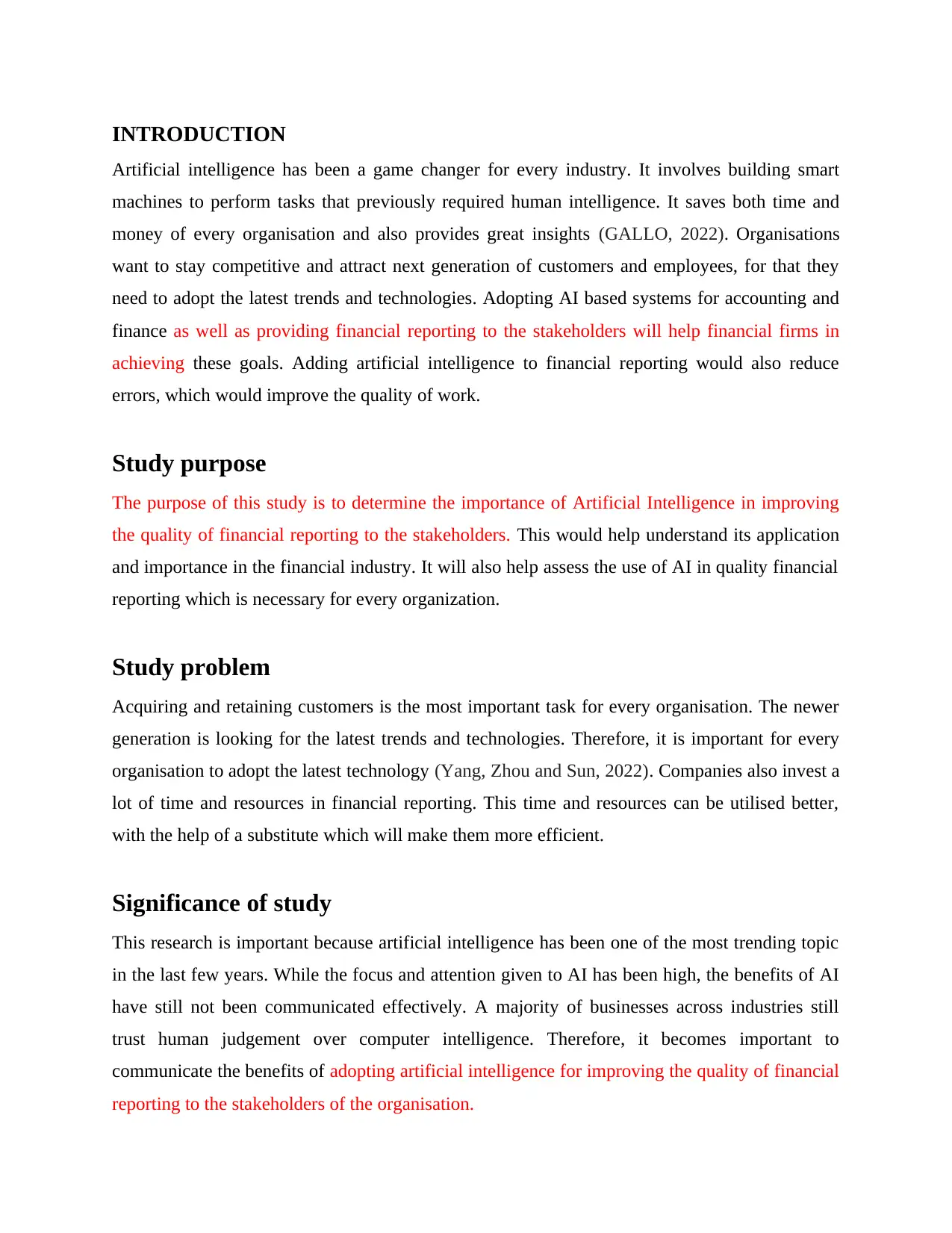
INTRODUCTION
Artificial intelligence has been a game changer for every industry. It involves building smart
machines to perform tasks that previously required human intelligence. It saves both time and
money of every organisation and also provides great insights (GALLO, 2022). Organisations
want to stay competitive and attract next generation of customers and employees, for that they
need to adopt the latest trends and technologies. Adopting AI based systems for accounting and
finance as well as providing financial reporting to the stakeholders will help financial firms in
achieving these goals. Adding artificial intelligence to financial reporting would also reduce
errors, which would improve the quality of work.
Study purpose
The purpose of this study is to determine the importance of Artificial Intelligence in improving
the quality of financial reporting to the stakeholders. This would help understand its application
and importance in the financial industry. It will also help assess the use of AI in quality financial
reporting which is necessary for every organization.
Study problem
Acquiring and retaining customers is the most important task for every organisation. The newer
generation is looking for the latest trends and technologies. Therefore, it is important for every
organisation to adopt the latest technology (Yang, Zhou and Sun, 2022). Companies also invest a
lot of time and resources in financial reporting. This time and resources can be utilised better,
with the help of a substitute which will make them more efficient.
Significance of study
This research is important because artificial intelligence has been one of the most trending topic
in the last few years. While the focus and attention given to AI has been high, the benefits of AI
have still not been communicated effectively. A majority of businesses across industries still
trust human judgement over computer intelligence. Therefore, it becomes important to
communicate the benefits of adopting artificial intelligence for improving the quality of financial
reporting to the stakeholders of the organisation.
Artificial intelligence has been a game changer for every industry. It involves building smart
machines to perform tasks that previously required human intelligence. It saves both time and
money of every organisation and also provides great insights (GALLO, 2022). Organisations
want to stay competitive and attract next generation of customers and employees, for that they
need to adopt the latest trends and technologies. Adopting AI based systems for accounting and
finance as well as providing financial reporting to the stakeholders will help financial firms in
achieving these goals. Adding artificial intelligence to financial reporting would also reduce
errors, which would improve the quality of work.
Study purpose
The purpose of this study is to determine the importance of Artificial Intelligence in improving
the quality of financial reporting to the stakeholders. This would help understand its application
and importance in the financial industry. It will also help assess the use of AI in quality financial
reporting which is necessary for every organization.
Study problem
Acquiring and retaining customers is the most important task for every organisation. The newer
generation is looking for the latest trends and technologies. Therefore, it is important for every
organisation to adopt the latest technology (Yang, Zhou and Sun, 2022). Companies also invest a
lot of time and resources in financial reporting. This time and resources can be utilised better,
with the help of a substitute which will make them more efficient.
Significance of study
This research is important because artificial intelligence has been one of the most trending topic
in the last few years. While the focus and attention given to AI has been high, the benefits of AI
have still not been communicated effectively. A majority of businesses across industries still
trust human judgement over computer intelligence. Therefore, it becomes important to
communicate the benefits of adopting artificial intelligence for improving the quality of financial
reporting to the stakeholders of the organisation.
Paraphrase This Document
Need a fresh take? Get an instant paraphrase of this document with our AI Paraphraser
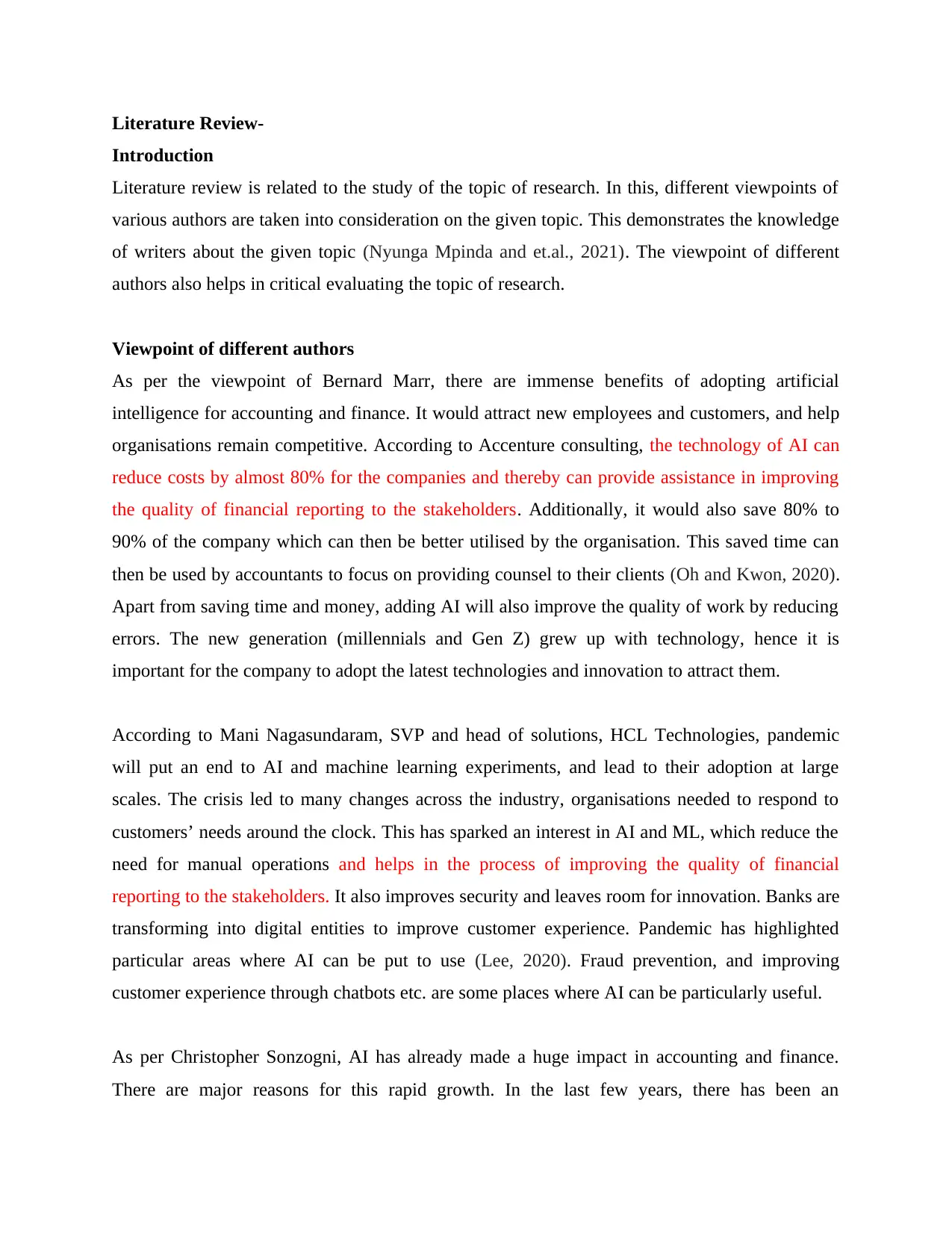
Literature Review-
Introduction
Literature review is related to the study of the topic of research. In this, different viewpoints of
various authors are taken into consideration on the given topic. This demonstrates the knowledge
of writers about the given topic (Nyunga Mpinda and et.al., 2021). The viewpoint of different
authors also helps in critical evaluating the topic of research.
Viewpoint of different authors
As per the viewpoint of Bernard Marr, there are immense benefits of adopting artificial
intelligence for accounting and finance. It would attract new employees and customers, and help
organisations remain competitive. According to Accenture consulting, the technology of AI can
reduce costs by almost 80% for the companies and thereby can provide assistance in improving
the quality of financial reporting to the stakeholders. Additionally, it would also save 80% to
90% of the company which can then be better utilised by the organisation. This saved time can
then be used by accountants to focus on providing counsel to their clients (Oh and Kwon, 2020).
Apart from saving time and money, adding AI will also improve the quality of work by reducing
errors. The new generation (millennials and Gen Z) grew up with technology, hence it is
important for the company to adopt the latest technologies and innovation to attract them.
According to Mani Nagasundaram, SVP and head of solutions, HCL Technologies, pandemic
will put an end to AI and machine learning experiments, and lead to their adoption at large
scales. The crisis led to many changes across the industry, organisations needed to respond to
customers’ needs around the clock. This has sparked an interest in AI and ML, which reduce the
need for manual operations and helps in the process of improving the quality of financial
reporting to the stakeholders. It also improves security and leaves room for innovation. Banks are
transforming into digital entities to improve customer experience. Pandemic has highlighted
particular areas where AI can be put to use (Lee, 2020). Fraud prevention, and improving
customer experience through chatbots etc. are some places where AI can be particularly useful.
As per Christopher Sonzogni, AI has already made a huge impact in accounting and finance.
There are major reasons for this rapid growth. In the last few years, there has been an
Introduction
Literature review is related to the study of the topic of research. In this, different viewpoints of
various authors are taken into consideration on the given topic. This demonstrates the knowledge
of writers about the given topic (Nyunga Mpinda and et.al., 2021). The viewpoint of different
authors also helps in critical evaluating the topic of research.
Viewpoint of different authors
As per the viewpoint of Bernard Marr, there are immense benefits of adopting artificial
intelligence for accounting and finance. It would attract new employees and customers, and help
organisations remain competitive. According to Accenture consulting, the technology of AI can
reduce costs by almost 80% for the companies and thereby can provide assistance in improving
the quality of financial reporting to the stakeholders. Additionally, it would also save 80% to
90% of the company which can then be better utilised by the organisation. This saved time can
then be used by accountants to focus on providing counsel to their clients (Oh and Kwon, 2020).
Apart from saving time and money, adding AI will also improve the quality of work by reducing
errors. The new generation (millennials and Gen Z) grew up with technology, hence it is
important for the company to adopt the latest technologies and innovation to attract them.
According to Mani Nagasundaram, SVP and head of solutions, HCL Technologies, pandemic
will put an end to AI and machine learning experiments, and lead to their adoption at large
scales. The crisis led to many changes across the industry, organisations needed to respond to
customers’ needs around the clock. This has sparked an interest in AI and ML, which reduce the
need for manual operations and helps in the process of improving the quality of financial
reporting to the stakeholders. It also improves security and leaves room for innovation. Banks are
transforming into digital entities to improve customer experience. Pandemic has highlighted
particular areas where AI can be put to use (Lee, 2020). Fraud prevention, and improving
customer experience through chatbots etc. are some places where AI can be particularly useful.
As per Christopher Sonzogni, AI has already made a huge impact in accounting and finance.
There are major reasons for this rapid growth. In the last few years, there has been an
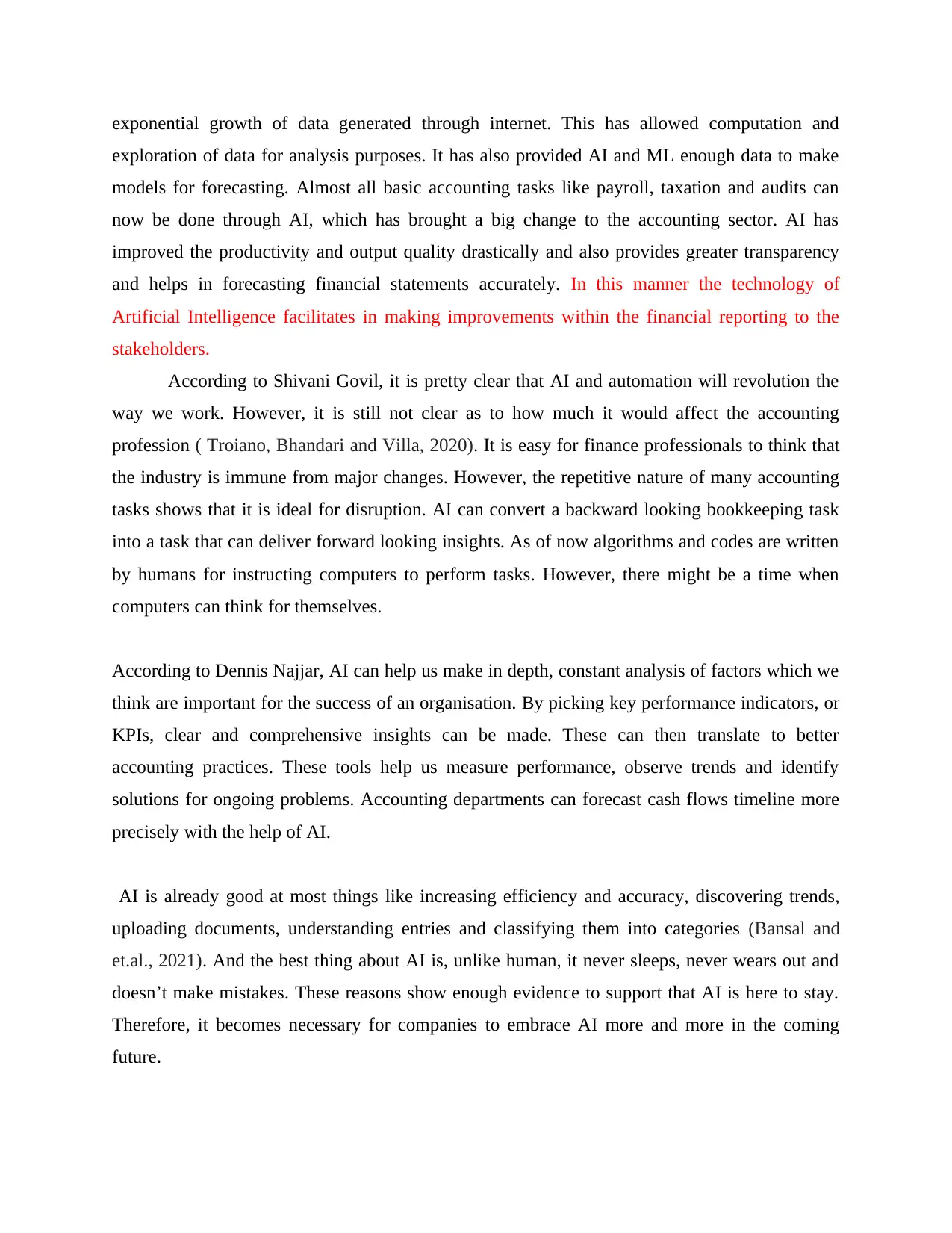
exponential growth of data generated through internet. This has allowed computation and
exploration of data for analysis purposes. It has also provided AI and ML enough data to make
models for forecasting. Almost all basic accounting tasks like payroll, taxation and audits can
now be done through AI, which has brought a big change to the accounting sector. AI has
improved the productivity and output quality drastically and also provides greater transparency
and helps in forecasting financial statements accurately. In this manner the technology of
Artificial Intelligence facilitates in making improvements within the financial reporting to the
stakeholders.
According to Shivani Govil, it is pretty clear that AI and automation will revolution the
way we work. However, it is still not clear as to how much it would affect the accounting
profession ( Troiano, Bhandari and Villa, 2020). It is easy for finance professionals to think that
the industry is immune from major changes. However, the repetitive nature of many accounting
tasks shows that it is ideal for disruption. AI can convert a backward looking bookkeeping task
into a task that can deliver forward looking insights. As of now algorithms and codes are written
by humans for instructing computers to perform tasks. However, there might be a time when
computers can think for themselves.
According to Dennis Najjar, AI can help us make in depth, constant analysis of factors which we
think are important for the success of an organisation. By picking key performance indicators, or
KPIs, clear and comprehensive insights can be made. These can then translate to better
accounting practices. These tools help us measure performance, observe trends and identify
solutions for ongoing problems. Accounting departments can forecast cash flows timeline more
precisely with the help of AI.
AI is already good at most things like increasing efficiency and accuracy, discovering trends,
uploading documents, understanding entries and classifying them into categories (Bansal and
et.al., 2021). And the best thing about AI is, unlike human, it never sleeps, never wears out and
doesn’t make mistakes. These reasons show enough evidence to support that AI is here to stay.
Therefore, it becomes necessary for companies to embrace AI more and more in the coming
future.
exploration of data for analysis purposes. It has also provided AI and ML enough data to make
models for forecasting. Almost all basic accounting tasks like payroll, taxation and audits can
now be done through AI, which has brought a big change to the accounting sector. AI has
improved the productivity and output quality drastically and also provides greater transparency
and helps in forecasting financial statements accurately. In this manner the technology of
Artificial Intelligence facilitates in making improvements within the financial reporting to the
stakeholders.
According to Shivani Govil, it is pretty clear that AI and automation will revolution the
way we work. However, it is still not clear as to how much it would affect the accounting
profession ( Troiano, Bhandari and Villa, 2020). It is easy for finance professionals to think that
the industry is immune from major changes. However, the repetitive nature of many accounting
tasks shows that it is ideal for disruption. AI can convert a backward looking bookkeeping task
into a task that can deliver forward looking insights. As of now algorithms and codes are written
by humans for instructing computers to perform tasks. However, there might be a time when
computers can think for themselves.
According to Dennis Najjar, AI can help us make in depth, constant analysis of factors which we
think are important for the success of an organisation. By picking key performance indicators, or
KPIs, clear and comprehensive insights can be made. These can then translate to better
accounting practices. These tools help us measure performance, observe trends and identify
solutions for ongoing problems. Accounting departments can forecast cash flows timeline more
precisely with the help of AI.
AI is already good at most things like increasing efficiency and accuracy, discovering trends,
uploading documents, understanding entries and classifying them into categories (Bansal and
et.al., 2021). And the best thing about AI is, unlike human, it never sleeps, never wears out and
doesn’t make mistakes. These reasons show enough evidence to support that AI is here to stay.
Therefore, it becomes necessary for companies to embrace AI more and more in the coming
future.
⊘ This is a preview!⊘
Do you want full access?
Subscribe today to unlock all pages.

Trusted by 1+ million students worldwide
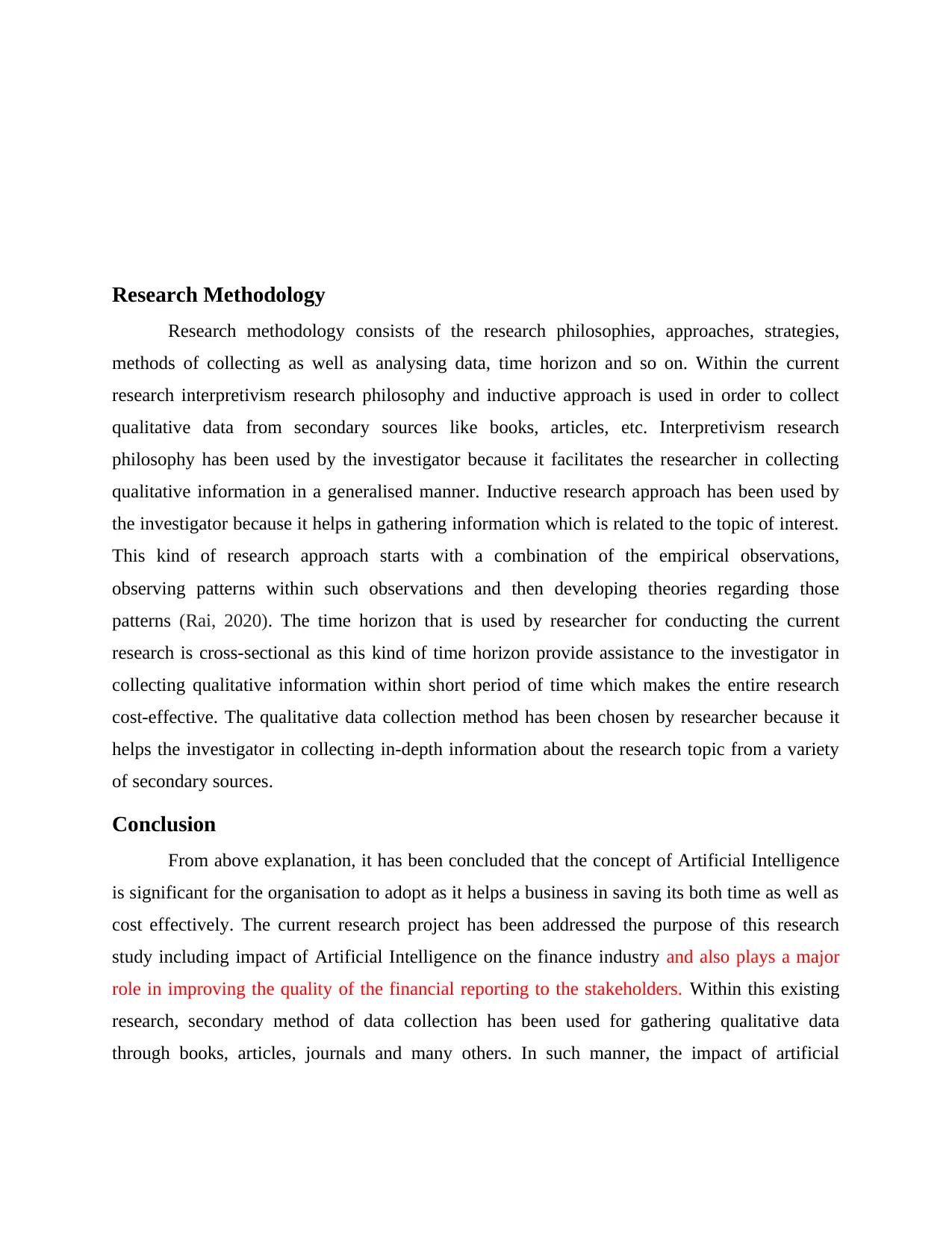
Research Methodology
Research methodology consists of the research philosophies, approaches, strategies,
methods of collecting as well as analysing data, time horizon and so on. Within the current
research interpretivism research philosophy and inductive approach is used in order to collect
qualitative data from secondary sources like books, articles, etc. Interpretivism research
philosophy has been used by the investigator because it facilitates the researcher in collecting
qualitative information in a generalised manner. Inductive research approach has been used by
the investigator because it helps in gathering information which is related to the topic of interest.
This kind of research approach starts with a combination of the empirical observations,
observing patterns within such observations and then developing theories regarding those
patterns (Rai, 2020). The time horizon that is used by researcher for conducting the current
research is cross-sectional as this kind of time horizon provide assistance to the investigator in
collecting qualitative information within short period of time which makes the entire research
cost-effective. The qualitative data collection method has been chosen by researcher because it
helps the investigator in collecting in-depth information about the research topic from a variety
of secondary sources.
Conclusion
From above explanation, it has been concluded that the concept of Artificial Intelligence
is significant for the organisation to adopt as it helps a business in saving its both time as well as
cost effectively. The current research project has been addressed the purpose of this research
study including impact of Artificial Intelligence on the finance industry and also plays a major
role in improving the quality of the financial reporting to the stakeholders. Within this existing
research, secondary method of data collection has been used for gathering qualitative data
through books, articles, journals and many others. In such manner, the impact of artificial
Research methodology consists of the research philosophies, approaches, strategies,
methods of collecting as well as analysing data, time horizon and so on. Within the current
research interpretivism research philosophy and inductive approach is used in order to collect
qualitative data from secondary sources like books, articles, etc. Interpretivism research
philosophy has been used by the investigator because it facilitates the researcher in collecting
qualitative information in a generalised manner. Inductive research approach has been used by
the investigator because it helps in gathering information which is related to the topic of interest.
This kind of research approach starts with a combination of the empirical observations,
observing patterns within such observations and then developing theories regarding those
patterns (Rai, 2020). The time horizon that is used by researcher for conducting the current
research is cross-sectional as this kind of time horizon provide assistance to the investigator in
collecting qualitative information within short period of time which makes the entire research
cost-effective. The qualitative data collection method has been chosen by researcher because it
helps the investigator in collecting in-depth information about the research topic from a variety
of secondary sources.
Conclusion
From above explanation, it has been concluded that the concept of Artificial Intelligence
is significant for the organisation to adopt as it helps a business in saving its both time as well as
cost effectively. The current research project has been addressed the purpose of this research
study including impact of Artificial Intelligence on the finance industry and also plays a major
role in improving the quality of the financial reporting to the stakeholders. Within this existing
research, secondary method of data collection has been used for gathering qualitative data
through books, articles, journals and many others. In such manner, the impact of artificial
Paraphrase This Document
Need a fresh take? Get an instant paraphrase of this document with our AI Paraphraser
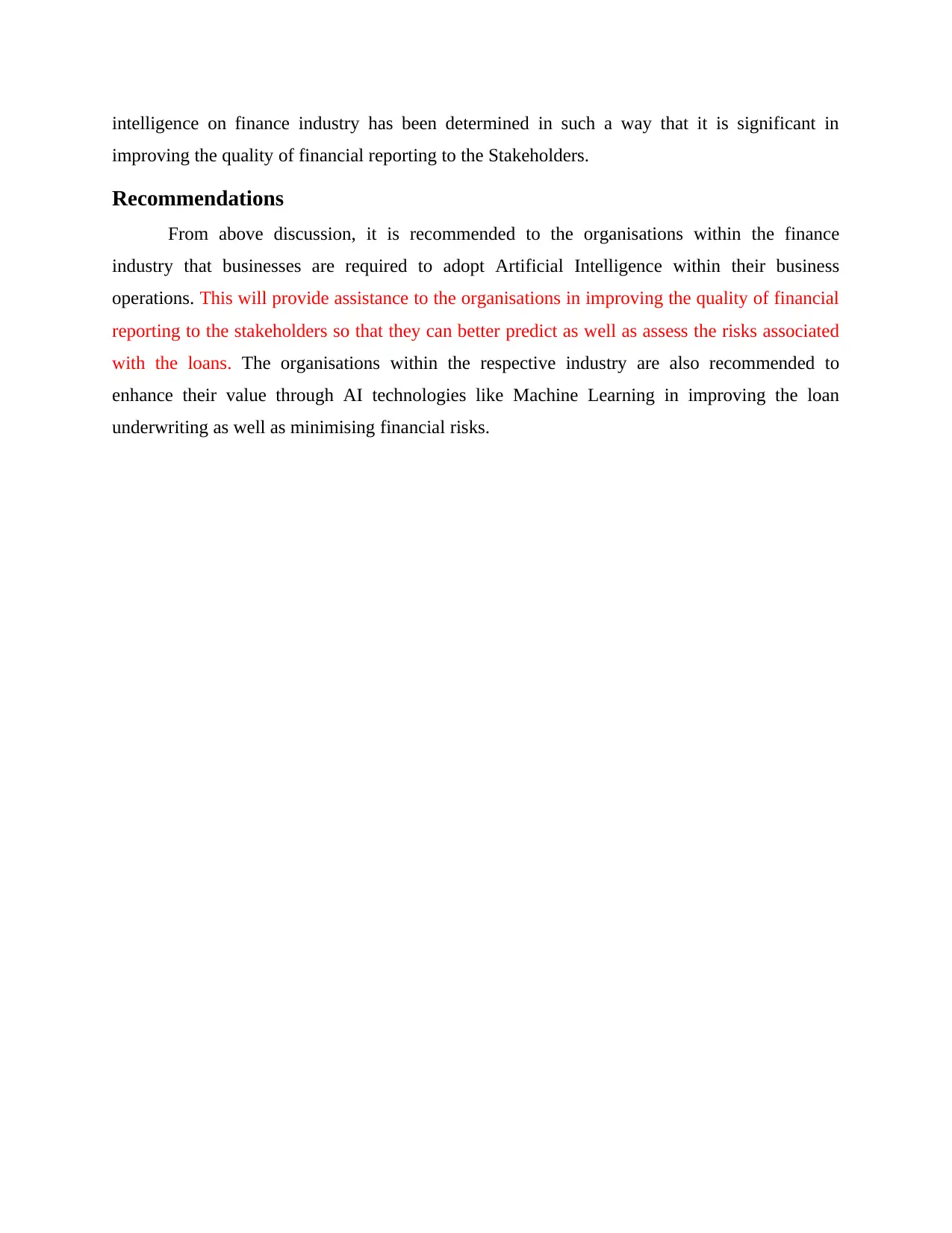
intelligence on finance industry has been determined in such a way that it is significant in
improving the quality of financial reporting to the Stakeholders.
Recommendations
From above discussion, it is recommended to the organisations within the finance
industry that businesses are required to adopt Artificial Intelligence within their business
operations. This will provide assistance to the organisations in improving the quality of financial
reporting to the stakeholders so that they can better predict as well as assess the risks associated
with the loans. The organisations within the respective industry are also recommended to
enhance their value through AI technologies like Machine Learning in improving the loan
underwriting as well as minimising financial risks.
improving the quality of financial reporting to the Stakeholders.
Recommendations
From above discussion, it is recommended to the organisations within the finance
industry that businesses are required to adopt Artificial Intelligence within their business
operations. This will provide assistance to the organisations in improving the quality of financial
reporting to the stakeholders so that they can better predict as well as assess the risks associated
with the loans. The organisations within the respective industry are also recommended to
enhance their value through AI technologies like Machine Learning in improving the loan
underwriting as well as minimising financial risks.
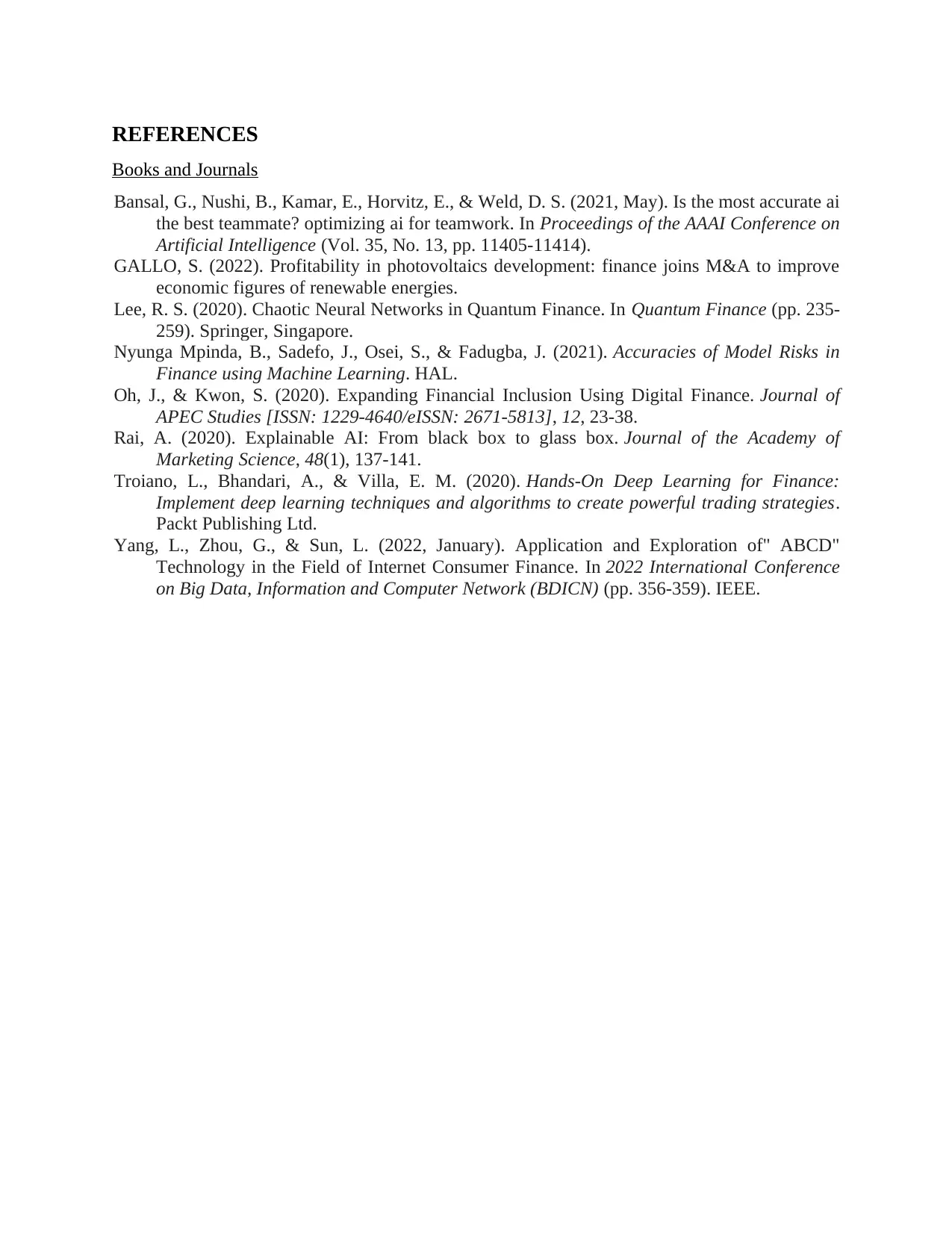
REFERENCES
Books and Journals
Bansal, G., Nushi, B., Kamar, E., Horvitz, E., & Weld, D. S. (2021, May). Is the most accurate ai
the best teammate? optimizing ai for teamwork. In Proceedings of the AAAI Conference on
Artificial Intelligence (Vol. 35, No. 13, pp. 11405-11414).
GALLO, S. (2022). Profitability in photovoltaics development: finance joins M&A to improve
economic figures of renewable energies.
Lee, R. S. (2020). Chaotic Neural Networks in Quantum Finance. In Quantum Finance (pp. 235-
259). Springer, Singapore.
Nyunga Mpinda, B., Sadefo, J., Osei, S., & Fadugba, J. (2021). Accuracies of Model Risks in
Finance using Machine Learning. HAL.
Oh, J., & Kwon, S. (2020). Expanding Financial Inclusion Using Digital Finance. Journal of
APEC Studies [ISSN: 1229-4640/eISSN: 2671-5813], 12, 23-38.
Rai, A. (2020). Explainable AI: From black box to glass box. Journal of the Academy of
Marketing Science, 48(1), 137-141.
Troiano, L., Bhandari, A., & Villa, E. M. (2020). Hands-On Deep Learning for Finance:
Implement deep learning techniques and algorithms to create powerful trading strategies.
Packt Publishing Ltd.
Yang, L., Zhou, G., & Sun, L. (2022, January). Application and Exploration of" ABCD"
Technology in the Field of Internet Consumer Finance. In 2022 International Conference
on Big Data, Information and Computer Network (BDICN) (pp. 356-359). IEEE.
Books and Journals
Bansal, G., Nushi, B., Kamar, E., Horvitz, E., & Weld, D. S. (2021, May). Is the most accurate ai
the best teammate? optimizing ai for teamwork. In Proceedings of the AAAI Conference on
Artificial Intelligence (Vol. 35, No. 13, pp. 11405-11414).
GALLO, S. (2022). Profitability in photovoltaics development: finance joins M&A to improve
economic figures of renewable energies.
Lee, R. S. (2020). Chaotic Neural Networks in Quantum Finance. In Quantum Finance (pp. 235-
259). Springer, Singapore.
Nyunga Mpinda, B., Sadefo, J., Osei, S., & Fadugba, J. (2021). Accuracies of Model Risks in
Finance using Machine Learning. HAL.
Oh, J., & Kwon, S. (2020). Expanding Financial Inclusion Using Digital Finance. Journal of
APEC Studies [ISSN: 1229-4640/eISSN: 2671-5813], 12, 23-38.
Rai, A. (2020). Explainable AI: From black box to glass box. Journal of the Academy of
Marketing Science, 48(1), 137-141.
Troiano, L., Bhandari, A., & Villa, E. M. (2020). Hands-On Deep Learning for Finance:
Implement deep learning techniques and algorithms to create powerful trading strategies.
Packt Publishing Ltd.
Yang, L., Zhou, G., & Sun, L. (2022, January). Application and Exploration of" ABCD"
Technology in the Field of Internet Consumer Finance. In 2022 International Conference
on Big Data, Information and Computer Network (BDICN) (pp. 356-359). IEEE.
⊘ This is a preview!⊘
Do you want full access?
Subscribe today to unlock all pages.

Trusted by 1+ million students worldwide
1 out of 9
Related Documents
Your All-in-One AI-Powered Toolkit for Academic Success.
+13062052269
info@desklib.com
Available 24*7 on WhatsApp / Email
![[object Object]](/_next/static/media/star-bottom.7253800d.svg)
Unlock your academic potential
Copyright © 2020–2026 A2Z Services. All Rights Reserved. Developed and managed by ZUCOL.




